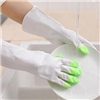Nitrile gloves are a staple in laboratory settings and are widely used by lab technicians due to their exceptional properties that ensure safety and efficiency. Here are some reasons why nitrile gloves are favored in laboratories:
- Chemical Resistance: Nitrile gloves provide excellent protection against a wide range of chemicals commonly used in laboratories, including acids, bases, solvents, and various reagents. This chemical resistance reduces the risk of skin exposure to potentially hazardous substances.
- Allergen-Free: Nitrile gloves are made from synthetic materials and do not contain natural rubber latex proteins. This makes them a suitable option for lab technicians and individuals who may have latex allergies or sensitivities.
- Puncture and Tear Resistance: Nitrile gloves are more durable than latex gloves and offer enhanced puncture and tear resistance. This durability is essential in laboratory settings where sharp instruments, glassware, and needles are frequently used.
- Sensitivity and Dexterity: Nitrile gloves provide good tactile sensitivity and dexterity, allowing lab technicians to handle small objects, pipettes, and delicate laboratory equipment with precision and control.
- Microorganism Protection: In biological laboratories, nitrile gloves act as a protective barrier against microorganisms, preventing potential contamination of samples or exposure to infectious agents.
- Single-Use Disposable: Nitrile gloves are typically designed for single-use, which is crucial in maintaining a sterile and hygienic lab environment. Discarding gloves after each task or experiment helps prevent cross-contamination between samples.
- Fit and Comfort: Nitrile gloves come in various sizes to accommodate different hand shapes. A well-fitted glove ensures comfort during long hours of lab work, reducing hand fatigue and discomfort.
- Autoclavable Options: Some nitrile gloves are designed to be autoclaved, allowing for sterilization and reuse, which can be beneficial for certain laboratory tasks that require frequent glove changes.
- Standard Compliance: Many laboratories follow specific safety regulations and guidelines that mandate the use of appropriate personal protective equipment, including gloves. Nitrile gloves are compliant with these standards and are considered a suitable option for laboratory work.
It’s essential for lab technicians to use gloves correctly to maintain a safe laboratory environment. This includes proper handwashing before and after glove use, avoiding touching the face or other surfaces while wearing gloves, and changing gloves when moving between tasks or working with different substances. Additionally, lab technicians should be aware of any specific glove requirements for specialized tasks, such as those involving extreme temperatures or highly reactive chemicals, and choose the appropriate glove accordingly.
















